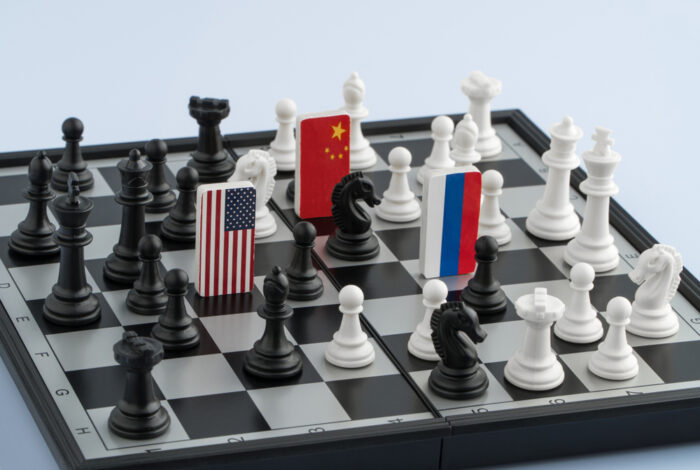The Progressive Post
The US cannot escape the European strategic autonomy debate

The US may wish to stay away from the European strategic autonomy debate, but the future of the transatlantic relationship remains the defining factor of the discussion. If the Biden administration is serious about engaging with allies, it needs to clarify its position on the concept.
The European debate on strategic autonomy often seems stuck in an endless loop of well-known arguments and counterarguments. The different actors of this discussion play their respective role perfectly: while France and EU officials are the explicit champions of the cause, the Poles, Baltics, and NATO representatives raise concerns and doubts about the overall concept. Between the two extremes of the spectrum, the other European powers provide various nuances and emphases.
The US, however, plays a more ambiguous part, and appears as the elephant in the room in most European discussions. In fact, European strategic autonomy is still very much about the US. Despite many attempts to consolidate and expand the concept to broader issues, the inertia of this debate is a perfect illustration of the inability of transatlantic partners to reform and recalibrate their relationship in order to adapt to the 21st century geopolitical environment.
The balance of power within the transatlantic security and defence partnership provides the framework for the strategic autonomy discussion. Within the alliance, the US remains a security provider, while European powers are mostly security benefiters. US political leaders – from Eisenhower to Trump – have repeatedly criticised European “security free-riding”, but their European counterparts were less than eager to change this comfortable position.
The concept of strategic autonomy has only recently gained traction in Europe when the dependency on the US has become more difficult to sustain. The evolution of the security environment in Europe and its Eastern and Southern neighbourhoods over the past ten years, as well as the growing unpredictability of US politics have led some Europeans to think that they could no longer rely on others to solve their problems.
Yet, translating this thinking into real action has not been easy. In Europe, the never-ending series of so-called ‘wake-up calls’, from the Syria 2013 ‘redline’ episode to the invasion of Crimea, the election of Donald Trump, and the evacuation of Kabul, has given new arguments to the proponents of strategic autonomy, but failed to convince all partners. In fact, the self-proclaimed EU “geopolitical Commission“, which is committed since 2020 to “use the language of power“, has not been able to show real improvements. Looking at the multiplicity of crises that have affected European and global stability for the past 18 months (the Chinese repression of the Hong Kong protests, the deepening of Russian influence in Belarus, the quasi-collapse of the Lebanese state, the return of the Taliban in power, to name a few), is a humbling experience for Europeans who aim to see the EU become a credible geopolitical actor.
European complacency is not the only reason for this apparent stalemate. US mixed messages very much participate in the confusion and have reinforced the existing dividing lines within Europe. The US is officially ambivalent: on the one hand, US leaders have declared their full support for any action that would allow Europeans to take more security responsibilities, and therefore lead to a more balanced burden-sharing among transatlantic partners. On the other hand, Washington has been historically anxious to see the EU become more autonomous in strategic affairs. EU initiatives are therefore criticised for decoupling NATO’s existing frameworks of cooperation or discriminating against US defence companies. The discussions about third-country participation in the European Defence Fund and Permanent Structured Cooperation (PESCO) projects perfectly illustrated this argument.
The context of the US-China strategic competition does not change the situation. The US encourages Europeans to think strategically when engaging with China. The US lobbying in Europe on the 5G technology was particularly interesting in that regard and produced some results. Promoting European strategic autonomy is therefore in the interest of the US, as it could help make Europeans develop tools to decrease European reliance on Chinese technologies and protect their critical infrastructure from Chinese investments. But the US is also critical of strategic autonomy if it implies equidistance between Washington and Beijing. Although US secretary of state Anthony Blinken insisted that the Biden administration would not force the allies to choose between China and the US, and president Macron rejected the idea that European would seek to hedge between the two global powers, this concern continues to feed US discussions.
The recent creation of the AUKUS security pact is the latest illustration of these mixed messages. The celebratory announcement in Washington DC of a “next-generation partnership” with the UK and Australia took place the very day that the EU released its own Indo-Pacific strategy calling for more cooperation with the US. While the Biden administration insisted that it wanted Europeans to work with the US in countering China’s influence, it acted against the interests of the most-engaged European country in the region – France – and in total secrecy vis-à-vis Brussels.
The confusion in the US position has direct implications on the European debate. Each capital interprets the US messages differently.
In Paris, the alignment between European strategic autonomy and the US requests for more responsibility-sharing is seen as the key argument. French diplomats insist that by making Europe less dependent on other actors, it also becomes a better partner to the US, which would eventually reinforce the transatlantic relationship.
On the contrary, Polish officials, along with Swedish, Baltic, and Romanian representatives, have underlined the risk of alienating the US if Europe sought to develop its strategic status by gradually decoupling European and US interests. Stressing that the EU had to build mechanisms to protect itself from the influence of global powers such as China and the US is seen as counterproductive and dangerous for transatlantic cooperation.
On this issue alone, the US remains unclear: would a more strategically autonomous Europe make the US more likely to engage or disengage from European security affairs? Many American perceive this as a theoretical and mostly useless debate that sustains European complacency. Yet Washington is the key to the debate as long as Europeans continue to refer to the US position to promote their own vision of the concept. For the future of the transatlantic relationship, European strategic autonomy has been deemed “necessary but impossible“. A clear and active US engagement in the discussion in support of initiatives that could make Europeans think and act more strategically would be a game-changer. Only then, the transatlantic partnership could be reformed and adapted.
Photo credits: Shutterstock
Related articles:
Facing the risks: making strategic autonomy work in practice, by Vassilis Ntousas
European strategic autonomy and human rights, by Daniela Schwarze




